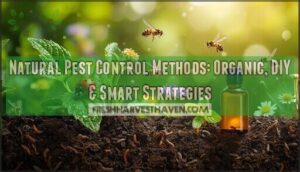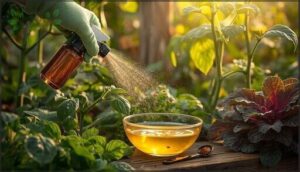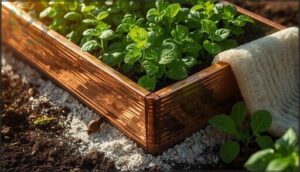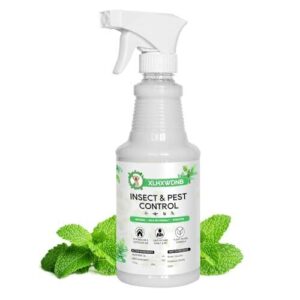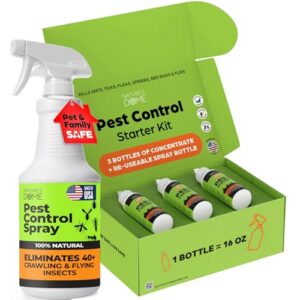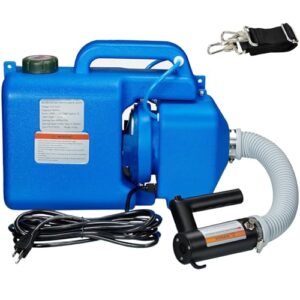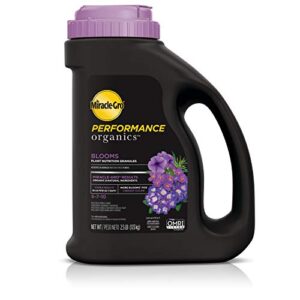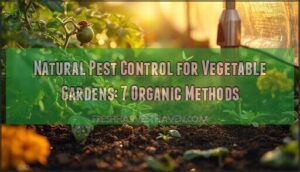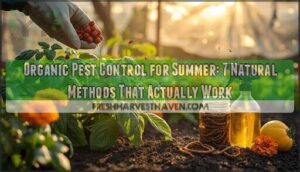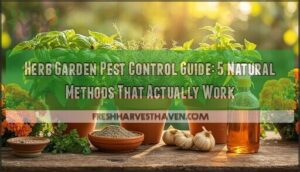This site is supported by our readers. We may earn a commission, at no cost to you, if you purchase through links.
Conventional pesticides kill indiscriminately—beneficial insects, soil organisms, and pollinators all take the hit alongside the target pest. Research from the Food and Agriculture Organization confirms that farms and gardens adopting Integrated Pest Management can slash pesticide applications by up to 90% without sacrificing yields or plant health.
That’s not a marginal improvement; it’s a fundamental shift in how pest control works. Natural pest control methods operate on a different logic entirely: instead of overwhelming a problem with chemicals, you redirect the ecosystem against it. Lady beetles consuming 60 aphids a day, parasitoid wasps neutralizing moth eggs before they hatch, neem oil disrupting insect molting cycles—these aren’t folk remedies, they’re precision tools.
What follows covers the strategies, organic treatments, and products that make this approach practical for any garden.
Table Of Contents
- Key Takeaways
- Essential Natural Pest Control Strategies
- Organic Sprays, Oils, and DIY Barriers
- Companion Planting and Garden Ecosystem Balance
- Top 5 Products for Natural Pest Control
- Frequently Asked Questions (FAQs)
- What’s the best natural pest control?
- What is a natural method for pest control?
- What is the holistic approach to pest control?
- What is the best natural pest control method?
- How do you get rid of insect pests naturally?
- How do you keep pests out of your yard?
- What is a good natural pest control?
- How do organic farmers get rid of pests?
- How to fumigate a house naturally?
- How to control pests using natural methods?
- Conclusion
Key Takeaways
- Integrated Pest Management can cut pesticide use by up to 90% without sacrificing yields, making it a science-backed alternative to conventional chemical approaches.
- Beneficial insects like lady beetles and parasitoid wasps act as precision pest controllers, consuming or neutralizing target pests without disrupting the broader ecosystem.
- Organic treatments such as neem oil, insecticidal soap, and physical barriers like diatomaceous earth deliver targeted pest control without leaving harmful chemical residues behind.
- Healthy soil with over 3% organic matter measurably reduces insect damage by activating natural plant defense compounds, making soil health your garden’s most foundational pest prevention tool.
Essential Natural Pest Control Strategies
Dealing with pests doesn’t mean reaching straight for the chemical spray — there are smarter ways to protect your garden that work with nature instead of against it.
From companion planting to beneficial insects, natural garden pest deterrent strategies can quietly do the heavy lifting before problems even start.
Natural pest control starts with a solid strategy, and knowing your options makes all the difference. Here are the core approaches that form the foundation of any effective, eco-friendly pest management plan.
Integrated Pest Management (IPM) Principles
Integrated Pest Management isn’t just a strategy — it’s a smarter relationship with your garden’s ecology.
IPM planning starts with pest monitoring, scouting regularly before problems escalate. You identify first, then act only when thresholds justify it.
This eco friendly, sustainable practice can cut pesticide use by up to 90%, making organic pest control both practical and science-backed from the ground up.
For more details on the ecosystem-based prevention concept, explore how IPM combines multiple approaches for long-term results.
Biological Control With Beneficial Insects
Beyond pesticide reduction, the real power of Integrated Pest Management comes alive when you recruit nature’s own workforce — beneficial insects.
Biological control means putting insect ecology to work for you. A single lady beetle consumes up to 5,000 aphids in its lifetime. Beneficial wasps like Trichogramma parasitize pest eggs directly, making parasite management surprisingly precise.
- Lady beetles eat 50–60 aphids daily
- Lacewing larvae attack aphids, whiteflies, and mites
- Parasitoid wasps target moth eggs before hatching
- Predatory mites clear spider mite outbreaks fast
- Predator introduction works best at low-to-moderate pest levels
For more information on the value of beneficial insect conservation principles, explore ways to support pollinators and natural pest control allies.
This biological balance is organic pest control at its most elegant.
Cultural Practices: Crop Rotation & Resistant Varieties
Beneficial insects handle the front lines, but cultural practices form the foundation beneath them.
Crop rotation breaks pest life cycles by denying insects a reliable host, cutting infestations without a single spray. Pair that with resistant varieties, and you’re stacking two barriers against the same threat.
| Practice | Benefit |
|---|---|
| Crop Rotation | Disrupts pest and nematode cycles |
| Resistant Varieties | Reduces disease and feeding damage |
| Cover Crops | Fosters soil health and suppresses weeds |
| Rotation + Resistance Combined | Delivers stronger, longer-lasting pest disruption |
Mechanical Methods: Hand-Picking, Traps, and Barriers
Cultural practices keep pest pressure low — but when bugs show up anyway, physical control finishes the job. Hand picking works surprisingly well on slow movers like tomato hornworms, especially at dawn.
For anything that crawls or flies past your defenses, natural pest sprays for herb gardens can knock out stubborn insects without leaving harmful residue behind.
Sticky traps and pheromone lures monitor populations before they explode. Row covers block early-season invaders, while copper barriers discourage slugs. Simple DIY pest control, smart pest removal, no chemicals needed.
Organic Sprays, Oils, and DIY Barriers
Sometimes the best defense against garden pests isn’t a chemical—it’s something you can mix up in your kitchen or find at a garden center.
Organic sprays and oils, and physical barriers work with your plants rather than against them, targeting pests precisely without leaving harsh residues behind. Here are four practical options worth knowing.
Using Neem Oil for Garden Pests
Neem oil is one of the most reliable organic pest control methods you can use against garden pests. Mix 1–2 tablespoons of concentrate per gallon of water, spray early morning or evening, and cover leaf undersides thoroughly.
Its active compound, azadirachtin, disrupts pest resistance by interfering with molting and feeding — making neem application effective against 200+ soft-bodied insects without harming beneficial predators.
Insecticidal Soaps and Homemade Oil Sprays
Insecticidal soap works by penetrating the soft cuticle of pests like aphids and spider mites, disrupting cell membranes until dehydration sets in — no harsh chemicals required.
Homemade recipes make natural pest control surprisingly accessible:
- Mix 5 tablespoons liquid castile soap per gallon of water
- Add 2.5 tablespoons vegetable oil for improved insecticidal action
- Apply oil sprays and homemade insecticidal soap at dusk or dawn
- Reapply every 4–7 days for consistent control
Natural Repellents: Mint, Citrus, and Wood Ash
Three kitchen staples — mint oil, citrus, and wood ash — quietly pull serious weight in any organic pest control strategy. Mint oil uses extend from deterring aphids with a simple peppermint-water spray to repelling ants at near 100% efficacy at tested rates.
Citrus peel sprays release limonene, naturally discouraging slugs and soft-bodied insects, while wood ash barriers dehydrate crawling pests on contact — genuinely eco-friendly pest control without compromise.
Physical Barriers for Slugs and Crawling Insects
Sometimes the simplest gardening techniques are the most effective. Physical barriers stop slugs and crawling insects before they ever reach your plants — no sprays needed.
- Copper tape on raised beds creates a mild deterrent effect; use uncoated strips at least 4 cm wide
- Fleece barriers made from wool deter slugs through texture while letting water through
- Diatomaceous earth rings damage insect outer coatings on contact, causing dehydration within 48 hours
- Slug collars protect individual seedlings as standalone pest prevention tools
Physical removal combined with these barriers gives you layered natural pest control.
Companion Planting and Garden Ecosystem Balance
Companion planting turns your garden into its own defense system — the right plants working together can quietly push pests away before they become a real problem.
It’s less about fighting nature and more about steering it in your favor. Here’s what you can do to build that balance from the ground up.
Repellent Herbs and Flowers for Pest Deterrence
Your scented garden can do more work than you think. Herb repellents like basil, rosemary, and mint mask nearby crops from insects, while flower borders of marigolds and nasturtiums act as natural deterrents by releasing compounds that confuse or repel pests.
In organic gardening, companion planting these pest resistant plants strategically — in dense bands near vegetables — reduces pressure without reaching for garlic spray or neem oil.
Attracting Pollinators and Beneficial Predators
Think of your garden as a living recruitment center for pest predators. Pollinator gardens built around diverse flower resources — dill, yarrow, mountain mint, and black-eyed Susan — draw beneficial insects like parasitic wasps and hoverflies that practice biological control on aphids and caterpillars.
Companion planting and intentional habitat structure turn natural pest control into a self-reinforcing system of pest prevention that keeps working season after season.
Building Healthy Soil for Pest Resistance
Healthy soil is your garden’s first line of defense. When soil organic matter exceeds 3%, plants suffer measurably less insect damage — and microbial diversity does much of the work, activating plant defense compounds that deter pests naturally.
Soil rich in organic matter and microbial life is a garden’s most powerful natural pest defense
Add compost, use organic mulches, and practice organic farming principles. Balanced nutrition keeps growth steady, supporting ecosystem balance and long-term biological control from the ground up.
Timing and Plant Placement for Prevention
Timing and placement are quiet powerhouses in any Integrated Pest Management System. Adjusting planting dates so vulnerable growth stages miss peak pest activity, and using strategic spatial placement of trap crops and companion planting, can dramatically cut pest migration into your main beds.
- Sow trap crops 3–4 weeks early to intercept pests first
- Use plant spacing that improves airflow and slows contact spread
- Position companion planting and crop rotation to disrupt pest cycles and support biological control
Top 5 Products for Natural Pest Control
Sometimes the right product makes all the difference between a garden that struggles and one that thrives pest-free. Whether you’re dealing with indoor invaders or outdoor nuisances, there are some solid, nature-friendly tools worth knowing about.
Here are five products that hold up well when you’re committed to keeping things organic and effective.
1. Natural Peppermint Bug Repellent Spray
Peppermint oil does more than make your garden smell fresh — it actively disrupts the scent trails ants and roaches rely on to navigate. This ready-to-use spray combines peppermint oil and geraniol in a formula that’s safe around pets and family, making it a practical everyday option.
You can use it indoors along baseboards and entry points or outside on patios. Keep in mind it’s a deterrent, not a cure — reapplication every day or two keeps it effective.
| Best For | Families and pet owners who want a natural, low-chemical way to keep ants, spiders, and roaches out of their home without worrying about toxic residue. |
|---|---|
| Safe for Pets | Yes, pet-friendly |
| Indoor Use | Yes |
| Outdoor Use | Yes |
| Pest Coverage | Ants, spiders, roaches |
| Eco-Friendly | Yes, plant-based |
| Ease of Use | Ready-to-use spray |
| Additional Features |
|
- Plant-based formula with peppermint oil and geraniol — safe around kids and pets
- Works indoors and outdoors, so one bottle covers your kitchen, bathroom, and patio
- Smells fresh instead of chemical, which is a nice bonus over traditional sprays
- The minty scent can be overpowering, especially in smaller indoor spaces
- You’ll need to reapply every day or two since the effects don’t last long
- At $19.98 for 16oz, it’s a bit pricey compared to conventional options
2. Nature’s Dome Pest Killer Spray
If you want broader coverage without sacrificing safety, Nature’s Dome takes a more aggressive approach. Its plant-based formula combines geraniol, cottonseed oil, and cinnamon oil to knock down over 40 pest species — ants, roaches, fleas, ticks, even mosquitoes.
That’s a serious range for an essential oil spray. You can use it indoors on baseboards and cabinet edges or outdoors along your home’s perimeter. It meets EPA 25(b) minimal risk standards, so it’s genuinely safe around kids and pets.
| Best For | Families with kids or pets who want a natural, wide-range pest solution they can use both inside and outside the house. |
|---|---|
| Safe for Pets | Yes, pet-safe |
| Indoor Use | Yes |
| Outdoor Use | Yes |
| Pest Coverage | Ants, roaches, spiders, flies |
| Eco-Friendly | Yes, non-toxic |
| Ease of Use | Ready-to-use spray |
| Additional Features |
|
- Kills over 40 pest types — ants, fleas, ticks, mosquitoes, and more
- EPA 25(b) certified, so it’s genuinely safe around kids and pets
- Works indoors and outdoors, giving you solid all-around coverage
- Needs frequent reapplication to stay effective long-term
- May struggle with tougher infestations, especially roaches
- Pricier than your standard pest spray off the shelf
3. Ultrasonic Pest Repellent Device
Sound alone can’t solve every problem, but the SUCGLES Ultrasonic Pest Repellent (Model HK-312) offers a genuinely chemical-free layer of defense worth considering. Operating between 10KHz and 65KHz, it targets rodents, roaches, ants, and mosquitoes by disrupting their nervous systems — no sprays, no residue, no odor.
Each unit draws just 3–5 watts, and a six-pack covers your whole home. Give it two to four weeks before judging results. For light infestations, it’s a low-effort, low-risk addition to your IPM toolkit.
| Best For | Homeowners dealing with light pest activity who want a simple, chemical-free option that won’t disrupt kids or pets. |
|---|---|
| Safe for Pets | Yes, chemical-free |
| Indoor Use | Yes |
| Outdoor Use | No |
| Pest Coverage | Mice, roaches, ants, mosquitoes |
| Eco-Friendly | Yes, chemical-free |
| Ease of Use | Plug-in device |
| Additional Features |
|
- Completely chemical-free and odorless — safe to run around kids, pets, and people with sensitivities
- Six units in one pack gives you whole-home coverage without buying multiple products
- Draws only 3–5 watts per unit, so it won’t make a dent in your electricity bill
- Results take 1–4 weeks, so don’t expect overnight relief
- Won’t cut it for serious infestations — you may still need a professional
- A small number of users report no effect at all, or even an uptick in pest activity
4. Lonyeon Electric Fogger Machine
When chemical-free coverage is the goal, the Lonyeon 8L Electric ULV Fogger gives you serious reach. Its cold-fogging nozzle disperses neem oil, essential oil blends, and other botanical solutions into a fine mist that coats leaf undersides — exactly where aphids and soft-bodied insects hide.
The adjustable flow rate means you can dial back output for a small patio or open it up for an entire yard. One 8-liter tank covers most properties in a single pass.
| Best For | Homeowners, gardeners, and facility managers who need to cover large areas quickly with botanical sprays, disinfectants, or pest control solutions. |
|---|---|
| Safe for Pets | Yes, with precautions |
| Indoor Use | Yes |
| Outdoor Use | Yes |
| Pest Coverage | General pest control |
| Eco-Friendly | Neutral |
| Ease of Use | Backpack fogger |
| Additional Features |
|
- The 8-liter tank and 40-foot reach let you cover big spaces — yards, barns, greenhouses — without constantly refilling or repositioning.
- Adjustable flow rate gives you real control, so you’re not wasting product on a small patio or under-spraying a large area.
- The backpack design keeps your hands free and makes it easy to move around for extended spraying sessions.
- Several users have reported the motor burning out or smoking after just a few uses, which is a real concern for something you’re counting on.
- It’s loud enough that you’ll need earplugs, and the fumes mean a mask is a must — not the most comfortable setup.
- Quality control seems inconsistent, so the unit you get may not hold up as long as you’d hope.
5. Miracle Gro Organic Plant Nutrition Granules
Healthy plants are your first line of defense against pests — and that’s where Miracle-Gro Performance Organics Granules earn their place in this list.
OMRI-listed and made from natural ingredients, these granules feed vegetables, herbs, and flowering plants for up to 4–6 weeks per application. You’ll often see results within 7 days.
Sprinkle about ¾ cup per 25 square feet, mix lightly into the top few inches of soil, and water in. Well-nourished plants simply resist pest pressure better.
| Best For | Gardeners who want an organic, easy-to-use fertilizer that boosts blooms and supports healthy growth in both garden beds and container plants. |
|---|---|
| Safe for Pets | Yes, organic |
| Indoor Use | Yes |
| Outdoor Use | Yes |
| Pest Coverage | Indirect via plant health |
| Eco-Friendly | Yes, OMRI listed |
| Ease of Use | Granule application |
| Additional Features |
|
- OMRI-listed and made with natural ingredients, so you can feed your plants without worrying about harsh chemicals
- Works fast — most people start seeing results within 7 days
- Versatile enough for flowers, tomatoes, roses, bonsais, and more
- Needs reapplying every 4–6 weeks, which adds up over a full growing season
- Granules can burn plant stems if they make direct contact, so careful application is a must
- Some buyers have run into packaging issues like loose lids or bags that weren’t fully filled
Frequently Asked Questions (FAQs)
What’s the best natural pest control?
Ironically, the “best” natural pest control isn’t a single product — it’s a system.
Integrated Pest Management combines prevention, biological controls, and targeted treatments to reduce pest pressure by up to 90% without harsh chemicals.
What is a natural method for pest control?
One reliable natural method is releasing beneficial insects — ladybugs and lacewings consume aphids and other soft-bodied pests on contact, reducing infestations without synthetic chemicals and supporting your garden’s long-term ecological balance.
What is the holistic approach to pest control?
The integrated approach treats your garden or home as a living system, combining prevention, biological controls, and minimal-risk products to keep pests below damaging levels — without chasing every last bug.
What is the best natural pest control method?
Integrated Pest Management is your best bet. It combines prevention, monitoring, and targeted treatment to cut pesticide use by up to 90% while keeping pests genuinely under control long-term.
How do you get rid of insect pests naturally?
Getting rid of insect pests naturally means working smarter, not harder — combining biological allies, targeted sprays, and smart planting to keep populations in check without reaching for harsh chemicals.
How do you keep pests out of your yard?
Keeping pests out of your yard starts with removing what attracts them — standing water, food scraps, and dense overgrowth.
Seal gaps, rotate crops, and lean on beneficial insects to hold the line.
What is a good natural pest control?
Good natural pest control starts with working smarter, not harder.
Neem oil, beneficial insects, companion planting, and crop rotation form a reliable foundation that keeps pest populations manageable without reaching for harsh chemicals.
How do organic farmers get rid of pests?
Organic farmers combine prevention and biology with targeted intervention. They rotate crops, scout fields regularly, release beneficial insects, and apply biopesticides like neem oil or Bacillus thuringiensis only when pest thresholds actually demand it.
How to fumigate a house naturally?
Natural house fumigation starts with deep cleaning, then applying essential oil sprays, diatomaceous earth along baseboards, and vinegar solutions on ant trails to disrupt pests without synthetic chemicals.
How to control pests using natural methods?
An ounce of prevention beats a pound of cure — start with regular scouting, support beneficial insects, rotate crops, and use targeted treatments like neem oil only when pest levels cross actionable thresholds.
Conclusion
Think of your garden as a city ecosystem with its own law enforcement: when the ecosystem is balanced, pests don’t run unchecked—they’re kept in line by predators, barriers, and plants that signal danger.
Natural pest control methods are exactly that civic infrastructure, built from soil health, biological allies, and targeted organic treatments. You’re not fighting nature anymore; you’re governing it. Build those systems deliberately, and the garden largely defends itself.
- https://humboldtssecretsupplies.com/blogs/articles/insecticidal-soap-vs-neem-oil-which-works-better
- https://genent.cals.ncsu.edu/bug-bytes/tactics/cultural/
- https://mariebostwick.com/natural-garden-pest-control-methods/
- https://onlineentomology.ifas.ufl.edu/eco-friendly-pest-control-3-natural-solutions-that-really-work/
- https://eartheasy.com/blogs/grow/natural-garden-pest-control

